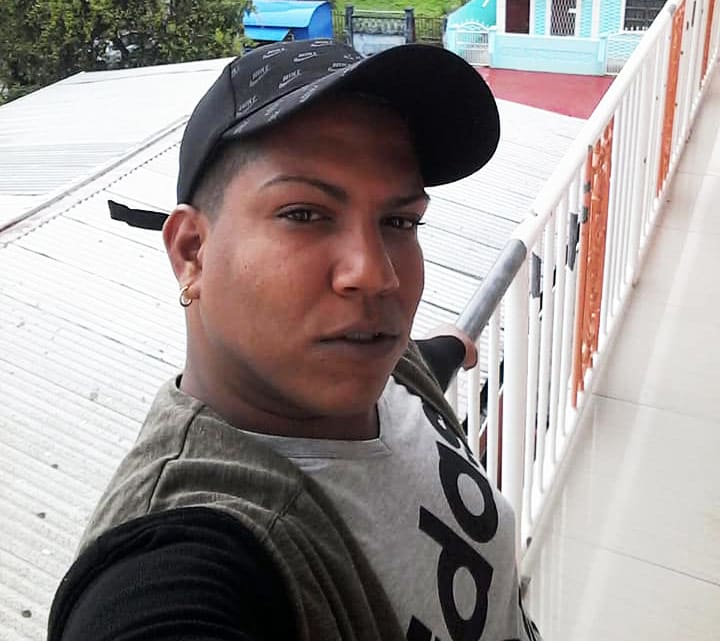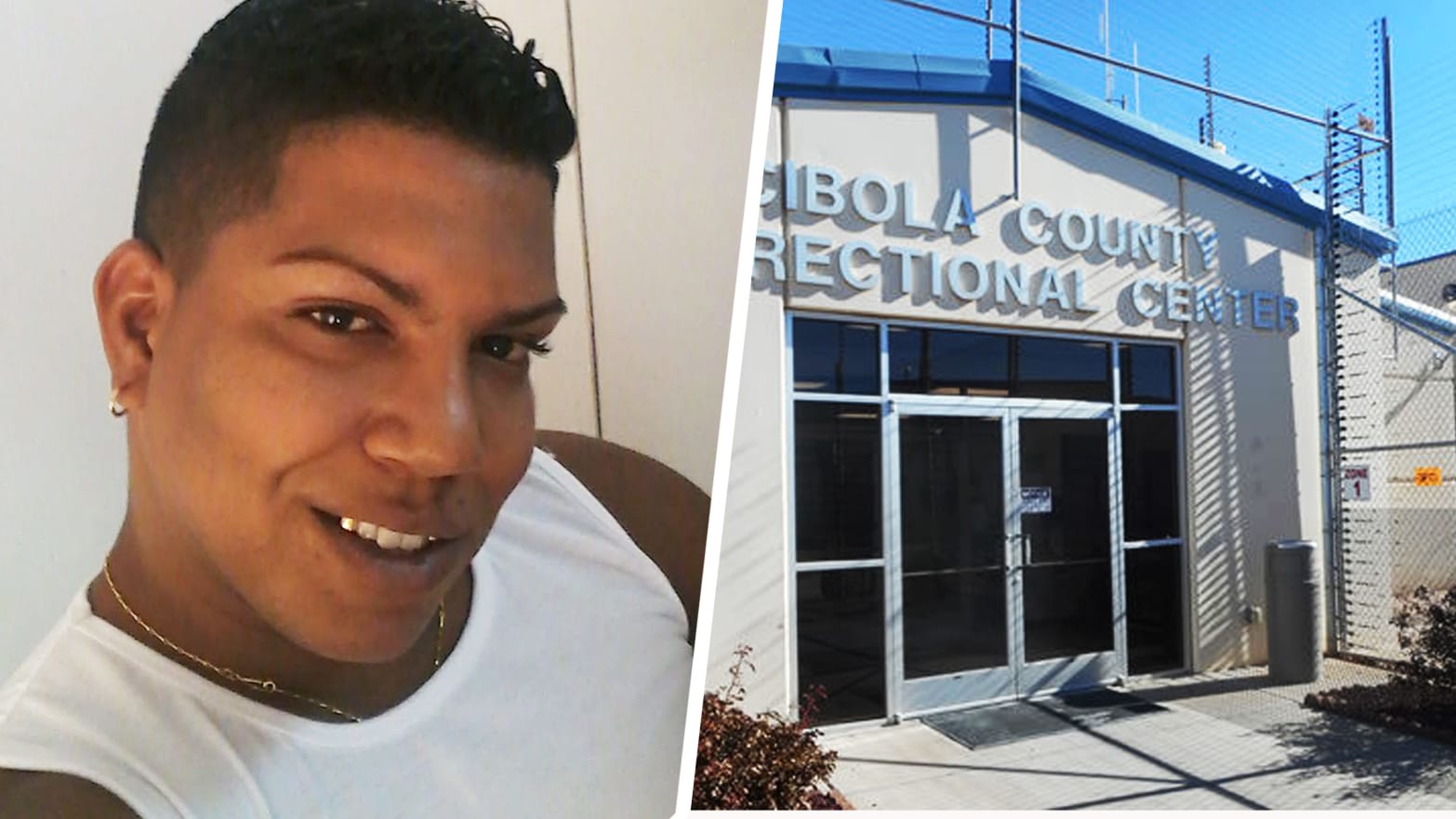Like many young people she knew, Barbara Boch-Sojo could list a dozen reasons why she wanted to leave Cuba. But it was being beaten and jailed for the crime of sitting in a public park while transgender that finally forced her hand.
“I was sitting in a public park with my friend, and the police came in to say that we needed to move from there, because we were not a good example for other people to see. And we didn’t want to,” Boch-Sojo, a 25-year-old trans woman, recalled.
After a brief argument with the officers, the police beat her and her friend with metal batons in the middle of the park before taking them away to a police station, where they were held for four days on charges of disturbing the public order.
“It was horrible,” Boch-Sojo said.
A few weeks later, Boch-Sojo fled her home, beginning a months-long journey to reach family and friends in the United States.
But at the conclusion of her journey to escape harassment and persecution at the hands of law enforcement—a journey through half a dozen counties where she nearly drowned and escaped deportation back to Cuba by the grace of a prison riot—Boch-Sojo was subjected to the same abuses that she’d fought so hard to leave behind, this time in an American detention center.
“The feeling is terrible sometimes,” Boch-Sojo told The Daily Beast, speaking through an interpreter from a public phone in the Jackson Parish Correctional Center in Jonesboro, Louisiana. “I need to take a shower at midnight or 12:30 because I cannot take a regular shower with the men, because sometimes the men will bully me… sometimes because it’s so late, I prefer not to even shower to avoid the situation.”
Until recently, undocumented trans women like Boch-Sojo had the option of being detained in a special unit with other trans migrants at the Cibola Correctional Center in rural New Mexico. But the Cibola unit, the only one of its kind, was rife with allegations of inhuman conditions, medical mistreatment, and physical and sexual abuse of transgender detainees. The unit was officially closed in January after internal reports from the Department of Homeland Security’s civil rights office and U.S. Immigration and Customs Enforcement’s health corps found that hundreds of requests for medical attention had been ignored by staff at the facility, which was operated by CoreCivic, the second-largest private prison company in the United States.
With Cibola’s closure, the number of immigration detention facilities where trans detainees had the option of being held exclusively with other trans people dropped to zero—leaving transgender women in detention with the option of either being housed with cisgender men or being held in solitary confinement.
“When she was being harassed by other people who are detained, the result of making any kind of complaint about that is solitary,” said Rebekah Wolf, an attorney with the American Immigration Lawyers Association who is advising Boch-Sojo’s pro bono legal team on her case. “They call it ‘isolation,’ but it’s not isolation—it’s full solitary confinement.”
As President Donald Trump’s years-long campaign of neglect and abuse of migrants in government custody draws to a close, there is now growing pressure on President-elect Joe Biden—who ran a campaign that highlighted his longtime commitment to LGBTQ equality—to release trans detainees from immigrant detention centers altogether.
“There is no middle of the road that works,” said Aaron Morris, the executive director of Immigration Equality, which advocates for LGBTQ and HIV-positive people in the immigration system. “All of the solutions that they have that involve incarceration don’t work—they’re too rife with abuse, the women’s health is compromised, safety is compromised, their access to recreation or legal services or you name it, all of it is diminished when they try to find a system that improves the conditions of confinement when it’s not really possible to do that.”
But Biden’s transition, while committing to overhauling Trump’s policies on asylum, immigrant detention and LGBT incarceration more broadly, has not yet committed to the wholesale release of transgender people are held in immigrant detention on humanitarian grounds. And that has left people like Boch-Sojo caught in the middle, with no idea how long she will be imprisoned in a facility where guards and fellow detainees alike have made her life a hell.

handout
“I feel very frustrated,” she told The Daily Beast. “I don’t know what to do.”
On March 6, 2019, less than three weeks after she was assaulted by the police, Boch-Sojo took a flight from Cuba to Panama, the first leg in a six-month journey that took her through seven countries across Central America. During that journey, she was harassed, assaulted, and feared drowning on two separate occasions. At one point, she was nearly deported back to Cuba until a prison riot at an immigrant detention center in Tapachula, Mexico, gave her and five others the chance to escape, hiding in a gymnasium until 4 a.m. before finding refuge in a safe house for migrants.
“The place was horrible—I needed to sleep almost on the floor because the mattresses were wet and moldy,” Boch-Sojo said of that detention center, where she was only given water twice a day and where she eventually asked to be put in isolation to avoid harassment and assault by the men with whom she had been detained. “There was no air conditioner, and there was a really awful smell.”
On Sept. 22, 2019, Boch-Sojo crossed the Rio Grande into McAllen, Texas with a group of nine other people, one of whom saved her from drowning in the river. Upon crossing, Boch-Sojo presented herself to border officials and sought to claim asylum.
“I just said, here I am,” Boch-Sojo recalled.
Despite a clear-cut case for asylum—Boch-Sojo’s beating and imprisonment in Cuba is a textbook example of persecution based on membership in a minority group—her request, which was processed without the benefit of counsel, was denied. She was ordered removed from the United States more than 300 days ago, but because of the breakdown in U.S.-Cuban relations, and because Cuba is refusing to accept deportees during the coronavirus pandemic, there is no expectation that she can be deported for the foreseeable future.

Handout/facebook
Boch-Sojo is now in limbo—unable to be deported, and detained indefinitely despite past Supreme Court rulings finding that the indefinite detention of undocumented immigrants when deportation is not possible is a violation of the Constitution's right to due process.
She has been in detention ever since, held at more than 10 different facilities across the American South. In all of these facilities, she has been housed alongside cisgender men, contrary to the universal consensus of medical and mental health organizations, as well as a 2015 memorandum issued under President Barack Obama mandating that transgender detainees have “the opportunity to shower in a setting that ensures safety and privacy.”
Once, while detained at an ICE processing center in Florida, Boch-Sojo was followed into a shower by a fellow detainee who exposed himself and began masturbating. At an ICE facility in Alexandria, Louisiana, her decision to report bullying and harassment by other detainees resulted in her being put in isolation, which she found even more stressful than the harassment.
“In essence, Barbara was punished because of other detainees’ intimidating behavior,” wrote Des Connall, an attorney at Ballard Spahr who is part of Boch-Sojo’s legal team, in a filing seeking her humanitarian release.
Connall’s request, however, was denied after ICE found that Boch-Sojo does not have “substantial ties to the community.” ICE’s findings came despite a signed letter from two sponsors and Boch-Sojo’s step-father—all of whom have known her since childhood and are either U.S. citizens or permanent residents—declaring that she would be safe in their custody.
At Jackson Parish, she told The Daily Beast, her mistreatment has even extended to a months-long campaign of sexual harassment by a guard. Initially, she said, the guard’s behavior was limited to touching her hair and giving her small, unwanted gifts. But when she was transferred back to Jackson Parish in October, she told The Daily Beast, the guard went to her room and ordered her to touch his genitals.
She reported the incident to ICE, but a cursory investigation found nothing suspicious about the officer, who continues to work at the facility, though he has kept a physical distance since she reported his behavior.
Reached for comment about Boch-Sojo’s allegations of mistreatment and harassment, an ICE spokesperson told The Daily Beast that an investigation found her accusations to be “baseless and without merit.”
“ICE provides a respectful, safe, and secure environment for all detainees, including those individuals who identify as transgender,” spokesperson Timothy Oberle told The Daily Beast. “Discrimination or harassment of any kind based on a detainee’s actual or perceived sexual orientation or gender identity is strictly prohibited. Moreover, ICE reaffirms its commitment to provide effective safeguards against sexual abuse and assault for all individuals detained in ERO custody.”
Scott Sutterfield, a spokesperson for LaSalle Corrections, which operates the facility, did not respond to emails or phone calls requesting comment.
“I feel like I’m in a well, with my hands and my feet tied, and no one is helping me,” Boch-Sojo said. “I feel hopeless. The days and the months go by, and I feel that way every day. I don’t know what to do because it’s a really horrible situation—people bully me, and I feel like I have no place.”
Like most candidates for office, Biden festooned his stump speech with ambitious pledges to reverse many of Trump’s most despised policies on his first day in office. Over the course of the campaign, his “Day One” agenda grew at a kudzu-like pace. On immigration alone, Biden has vowed to end Trump’s ban on entry into the United States from seven majority-Muslim nations, eliminate the “remain in Mexico” policy on those seeking asylum, grant refugee status to tens of thousands of Venezuelans, send legislation to Congress creating a roadmap to citizenship undocumented immigrants, and create a task force to reunify migrant children who were separated from their families under the Trump administration’s “zero-tolerance” policy—all on his first day in office.
But those in the immigrant-rights space have grown increasingly frustrated with the Biden transition, believing that the president-elect’s team is trying to move the goalposts on issues that Biden once framed as vital to restoring “the soul of the nation.”
In a phone call with reporters on Tuesday, transition officials cautioned that policy transformation at the U.S. southern border wouldn’t happen “overnight”—another word for “on day one”—because the Biden administration would “need time” to untangle the Gordian Knot of bad ideas that made up Trump’s approach to immigration.
In an interview with Spanish wire service EFE published on Monday, future domestic policy adviser Susan Rice and national security adviser Jake Sullivan both previewed the transition’s soft-pedaling on immigration issues, cautioning people who have waited at the border for months that ports of entry will not “suddenly be fully open to process everyone on day one,” as Rice put it.
“We will be able to take some steps to change policies right away,” Rice continued. “Others will take time to put in place, and the situation at the border will not transform overnight due in large part to the damage done over the last four years, but we are committed to addressing it in full.”
For those who have spent four years in the trenches of both immigration policy and LGBTQ rights—including organizations that fought hard to get Biden elected—those assurances indicate that the transition either doesn’t understand the severity of the problem, or those tasked with tearing down the Trump immigration superstructure in its entirety aren’t committed to doing so.
“ICE has proven that they are not capable of keeping transgender people safe,” said Rodrigo Heng-Lehtinen, deputy executive director of the National Center for Transgender Equality. “It’s essential that transgender people have alternatives to detention, just like other vulnerable people like seniors and those with certain medical conditions.”
Heng-Lehtinen, who serves of the board of directors of AsylumConnect, a non-profit connecting LGBTQ asylum seekers with resources in the U.S. and Canada, noted that incarcerated transgender people are at a much higher risk of violence in immigration detention centers than the general population, and also face higher rates of solitary confinement and medical malpractice in detention settings.
Those facts wouldn’t change by simply re-creating facilities like Cibola, Heng-Lehtinen said.
“Undocumented transgender people face among the highest risks of discrimination, violence and exploitation. When they are imprisoned, the level of violence and abuse they face in dangerous jails and prisons is horrifying,” Heng-Lehtinen added. “Our immigration and criminal justice systems fail transgender people and particularly immigrant transgender people, and must be reformed.”
Sensing this backsliding on the “Day One” agenda, Immigration Equality is working with other movement organizations to draft an open letter with the goal of pushing the Biden administration to release transgender people from immigration detention on compassionate grounds. ICE, Morris said, has tried it both ways—detaining trans migrants both together and with cisgender migrants—and failed both times. To him, those failures are proof that simply returning to a previous broken system won’t work, and a reason to hold Biden’s feet to the fire on releasing trans detainees.
“We’re taking a much harder line with this administration,” Morris said. “It’s not possible for you to do this safely. I’m not interested in compromise—compromise didn’t work.”
In response to that pressure, one Biden transition official, speaking on background, suggested that implementing the Obama administration’s “Trans Care Memo” into the operations of immigrant detention facilities would be a positive first step in holding ICE accountable for the conditions in its facilities.
But Neela Goshal, associate director of the LGBT Rights Program at Human Rights Watch, said that “would not go far enough” in ending the mistreatment of trans people in immigrant detention. Goshal said that the current practice of holding trans women in men’s facilities is just another iteration of ICE’s negligence in dealing with transgender detainees, and instead urged the Biden administration to issue a directive preventing ICE detention of trans people, period, calling the mixed-gender detention of transgender migrants “appalling.”
“ICE has not demonstrated that it is capable of keeping transgender women safe in immigration detention,” said Goshal, who noted that Human Rights Watch recommended four years ago that ICE be barred from holding transgender women in men’s facilities—exactly what the agency is doing now. “Ultimately, detention of transgender immigrants and asylum seekers because of their immigration status needs to end.”
Asked about the future of the policy, and about growing calls to release all trans immigrant detainees on humanitarian grounds, the Biden transition pointed to the president-elect’s immigration plan, which would reform the asylum process, address abuses in the detention system, and end prolonged detention of non-dangerous migrants seeking asylum.
“President-elect Biden is committed to strengthening protections for LGBTQ+ immigrants, asylum seekers and refugees,” said transition spokesperson Jamal Brown. “His administration will work to ensure LGBTQ+ immigrants, refugees and asylum seekers have access to necessary services and protections, invest in proven alternatives to detention and non-profit case management programs, and hold ICE and CBP accountable for inhumane treatment.”
But for Boch-Sojo, whose birthday is next week, every day she is forced to be in her current environment is another day of potential harassment, abuse and insecurity.
“Transgender people are alive and they are happy,” Boch-Sojo said. “We’re cheerful people. We’re not born to be incarcerated or kept in one place.”

